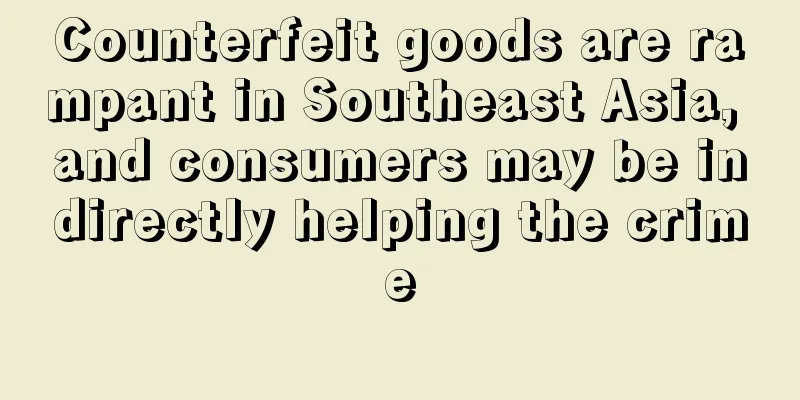Counterfeit goods are rampant in Southeast Asia, and consumers may be indirectly helping the crime

|
The outbreak of the epidemic in early 2020 has brought great threats to every country. To this day, the epidemic is still affecting people's lives. But threats are also challenges. Online shopping has become the main way for people to kill time and kill boredom.
For nearly 700 million people in Southeast Asia, whether using Bukalapak, Carousell, Lazada, Shopee or Tokopedia, most consumers can choose their favorite products on e-commerce platforms, and online consumption has become an inevitable trend.
Although most traded products are legal and healthy, there are shadows under the sun. Some criminals took advantage of the fact that the government was busy controlling the epidemic and had no time to clean up the market, using online markets to conduct illegal trade, selling e-cigarettes, synthetic drugs, counterfeit drugs, and even some toys that have not been safety tested, and making huge profits.
The United Nations Office on Drugs and Crime estimated in a 2019 report that the trade in counterfeit goods in Southeast Asia's online trading market is worth $35.9 billion per year, and this figure does not include the sales of counterfeit drugs. According to a Google research report, this figure will surge due to the coronavirus and the boom in Southeast Asian e-commerce, and is expected to reach $300 billion in 2025.
The EU -ASEAN Business Council published a paper in October 2020 on the impact of the coronavirus on online black markets in Southeast Asia, pointing out that e-commerce platforms such as Carousell have been blacklisted in the US trade market for selling counterfeit and pirated products.
Due to the impact of the coronavirus, the government has introduced a large number of business rules and protocols, but illegal businesses are not cooperating. For example, when the Malaysian government implemented a ban, illegal tobacco sales increased, and Malaysian authorities lost about 1 billion ringgit (US$237 million) in tobacco taxes.
E-cigarettes are also illegal in Singapore, but they can still be purchased on the Telegram platform, and the trade volume has increased sharply during the epidemic. Many consumers said that e-cigarette products can induce smoking when working from home.
On the surface, illegal trade harms the interests of normal enterprises, but in fact, these illegal companies do not pay taxes. When the government loses billions of tax revenue, it is still every citizen, including these consumers, who pays for national development and urban construction.
The editor hereby reminds cross-border sellers that they must stop selling counterfeit and shoddy goods, otherwise the consequences will be very serious if they are caught by the platform. Rejecting illegal trade should be the responsibility of each of us. Southeast Asia Counterfeit drugs |
>>: The 2021 Fortune 500 list is released, with Walmart first and Amazon third
Recommend
Performance soars! Jiazhilian's parent company's half-year net profit is expected to increase by 131.58%
Performance in the first half of the year increas...
Southeast Asian platform ShopBack reveals: Indonesians pay the most attention to...
2020 is an extraordinary year. People's lives...
The average online shopping expenditure per capita is US$304, and Türkiye's e-commerce market has great potential
The report shows that the average online shopping...
What is Zhongpin Group? Zhongpin Group Review, Features
Zhongpin Group provides Amazon individual sellers...
Vietnam gradually lifts lockdown, millions of workers flee! Supply chain crisis intensifies
Starting from July this year , Vietnam began to s...
Albertsons partners with Google to boost digital sales
Albertsons , a leading grocery group in the Unite...
Shopee store data analysis: These factors cannot be ignored!
Shopee sellers are no exception. Only by clarifyi...
A large number of Amazon fee adjustments will take effect next week!
Previously, Amazon notified the changes in logist...
What is Anjun Logistics? Anjun Logistics Review, Features
Shenzhen Anjun Logistics Co., Ltd. was establishe...
What is BEDSTORY? BEDSTORY Review, Features
BEDSTORY aims to let people enjoy life through goo...
What is xsolla? xsolla Review, Features
<span data-docs-delta="[[20,{"gallery"...
Amazon Israel offers free home delivery for orders over $65
According to foreign media reports, global shoppi...
What is Huisu Supply Chain? Huisu Supply Chain Review, Features
Huisu Supply Chain (Shenzhen Huisu Supply Chain Co...
Amazon is carrying out humanitarian efforts in Ukraine
" There is no doubt that there are deep conc...
What is One-touch? One-touch Review, Features
One-touch ( Shenzhen One-touch Enterprise Service...









